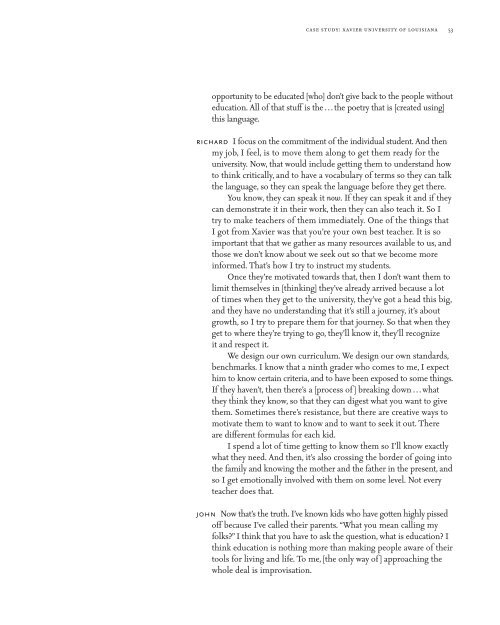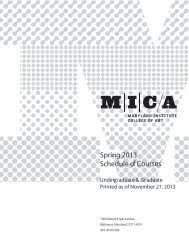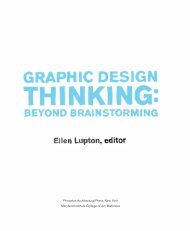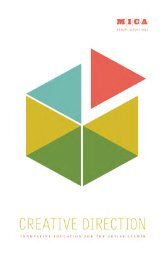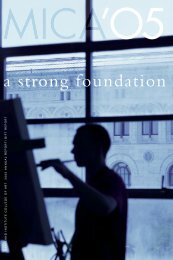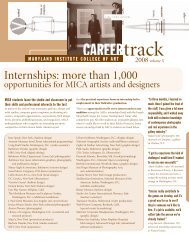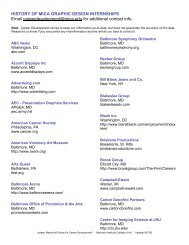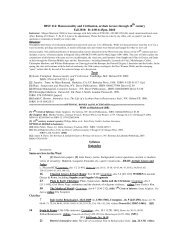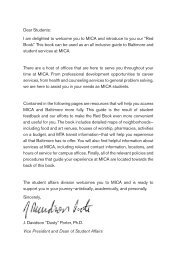art/vision/voice - Maryland Institute College of Art
art/vision/voice - Maryland Institute College of Art
art/vision/voice - Maryland Institute College of Art
Create successful ePaper yourself
Turn your PDF publications into a flip-book with our unique Google optimized e-Paper software.
case study: xavier university <strong>of</strong> louisiana 53<br />
opportunity to be educated [who] don’t give back to the people without<br />
education. All <strong>of</strong> that stuff is the . . . the poetry that is [created using]<br />
this language.<br />
richard I focus on the commitment <strong>of</strong> the individual student. And then<br />
my job, I feel, is to move them along to get them ready for the<br />
university. Now, that would include getting them to understand how<br />
to think critically, and to have a vocabulary <strong>of</strong> terms so they can talk<br />
the language, so they can speak the language before they get there.<br />
You know, they can speak it now. If they can speak it and if they<br />
can demonstrate it in their work, then they can also teach it. So I<br />
try to make teachers <strong>of</strong> them immediately. One <strong>of</strong> the things that<br />
I got from Xavier was that you’re your own best teacher. It is so<br />
important that that we gather as many resources available to us, and<br />
those we don’t know about we seek out so that we become more<br />
informed. That’s how I try to instruct my students.<br />
Once they’re motivated towards that, then I don’t want them to<br />
limit themselves in [thinking] they’ve already arrived because a lot<br />
<strong>of</strong> times when they get to the university, they’ve got a head this big,<br />
and they have no understanding that it’s still a journey, it’s about<br />
growth, so I try to prepare them for that journey. So that when they<br />
get to where they’re trying to go, they’ll know it, they’ll recognize<br />
it and respect it.<br />
We design our own curriculum. We design our own standards,<br />
benchmarks. I know that a ninth grader who comes to me, I expect<br />
him to know certain criteria, and to have been exposed to some things.<br />
If they haven’t, then there’s a [process <strong>of</strong> ] breaking down . . . what<br />
they think they know, so that they can digest what you want to give<br />
them. Sometimes there’s resistance, but there are creative ways to<br />
motivate them to want to know and to want to seek it out. There<br />
are different formulas for each kid.<br />
I spend a lot <strong>of</strong> time getting to know them so I’ll know exactly<br />
what they need. And then, it’s also crossing the border <strong>of</strong> going into<br />
the family and knowing the mother and the father in the present, and<br />
so I get emotionally involved with them on some level. Not every<br />
teacher does that.<br />
john Now that’s the truth. I’ve known kids who have gotten highly pissed<br />
<strong>of</strong>f because I’ve called their parents. “What you mean calling my<br />
folks?” I think that you have to ask the question, what is education? I<br />
think education is nothing more than making people aware <strong>of</strong> their<br />
tools for living and life. To me, [the only way <strong>of</strong> ] approaching the<br />
whole deal is improvisation.


